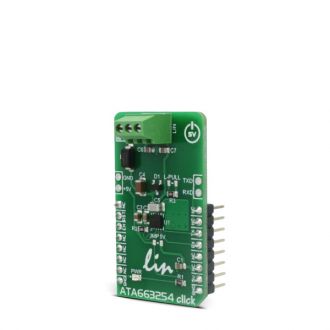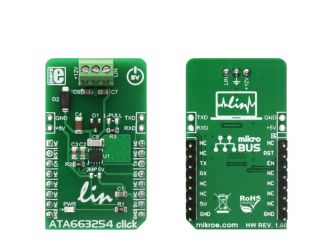
We strongly encourage users to use Package manager for sharing their code on Libstock website, because it boosts your efficiency and leaves the end user with no room for error. [more info]

Rating:
Author: MIKROE
Last Updated: 2018-07-12
Package Version: 1.0.0.0
mikroSDK Library: 1.0.0.0
Category: LIN
Downloaded: 5552 times
Not followed.
License: MIT license
ATA663254 click is a fully integrated LIN transceiver device with an integrated 5V LDO voltage regulator.
Do you want to subscribe in order to receive notifications regarding "ATA663254 click" changes.
Do you want to unsubscribe in order to stop receiving notifications regarding "ATA663254 click" changes.
Do you want to report abuse regarding "ATA663254 click".


Library Description
Library caries functions for sending and receiving data bytes, also for checking if the data byte is ready for reading.
void ata663254_enable(uint8_t state) - Function enables and disables click
void ata663254_writeByte(uint8_t input) - Function writes (sends) one byte in the RX buffer
uint8_t ata663254_readByte() - Function reads (receives) one byte from the RX buffer
uint8_t ata663254_ready() - Function checks is new data placed in the RX buffer
uint8_t ata663254_getRstState() - Function checks RST pin if undervoltage detection happens
Examples Description
void applicationTask()
{
// RECEIVER
#ifdef __RX__
if(ata663254_ready())
{
tmp = ata663254_readByte();
mikrobus_logWrite(&tmp, _LOG_BYTE);
}
#endif
// TRANSMITER
#ifdef __TX__
uint8_t cnt;
for (cnt = 0; cnt < 9; cnt++)
{
ata663254_writeByte(MESSAGE_DATA[cnt]);
}
Delay_ms(2000);
#endif
}
Additional notes and information
Depending on the development board you are using, you may need USB UART click, USB UART 2 clickor RS232 click to connect to your PC, for development systems with no UART to USB interface available on the board. The terminal available in all MikroElektronika compilers, or any other terminal application of your choice, can be used to read the message.